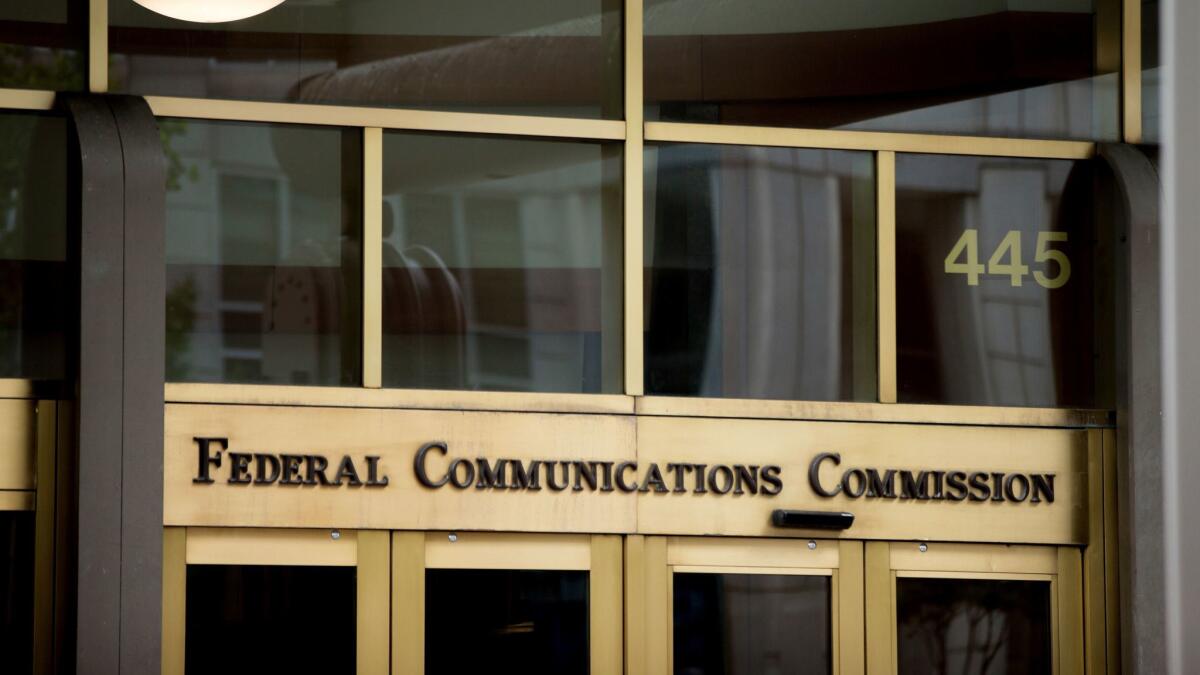Editorial: The relentless fighting over net neutrality rules needs to end, but how can it?

- Share via
Under its last chairman, Democrat Tom Wheeler, the Federal Communications Commission dramatically ramped up its regulation of telecommunications companies, especially those that provide broadband Internet access to the home. The commission adopted rules to preserve net neutrality, limit the collection and use of data about where people go online and subsidize broadband access services, while also slapping conditions on or flat-out opposing mergers between major broadband companies.
Although the telecom industry resisted many of these steps as heavy handed and overly restrictive, Internet users, consumer groups and scores of companies that offer content, apps and services online welcomed them as prudent limits on broadband providers who face too little competition. And they’re right about that — far too many consumers today have only one or two practical options for high-speed Internet access at their homes today.
Since becoming the FCC’s new chairman in January, however, Ajit Pai, a deregulatory-minded Republican, has moved the agency just as aggressively in the opposite direction. To Pai, Wheeler was like a father who loaded up his teenager’s bike with training wheels, a bell, lights, a basket, saddle bags, a water bottle, reflective tape along the frame, hand and coaster brakes, and a clip on can of pepper spray just in case. By the time he was done, the bike was too unwieldy to ride.
Market forces can’t be counted on to protect net neutrality, given how few options for broadband service most homes have.
Pai’s latest target is the net neutrality rules the commission adopted in 2015 after a federal appeals court threw out the commission’s previous neutrality regulations. The 2015 rules try to preserve the openness that has been crucial to the Internet’s success by barring broadband providers from blocking or impeding legal sites and services, favoring some sites’ traffic in exchange for pay, or unreasonably interfering with the flow of data on their networks.
These are all vitally important principles, as even opponents of the rules recognize. The fight has largely been over how strictly they should be interpreted and enforced. In particular, the dispute has been over the FCC’s move to reclassify broadband providers as utilities, which a federal appeals court ruled the commission had to do before it could impose blanket prohibitions on blocking, throttling or prioritizing data. The reclassification also subjected providers to some of the same, decades-old rules as local phone monopolies.
The process of undoing a rule usually requires another public notice and months of public comment on the proposed change. But Pai may take a procedural shortcut next month that undoes the utility classification right away. And instead of having neutrality rules that the FCC would enforce, Pai may call on broadband providers to pledge not to block, impede or prioritize traffic unreasonably — with the Federal Trade Commission available to slap the hands of any provider that goes back on its pledge.
That’s a laughable idea. Dropping the “utility” classification would make it harder for the FCC to protect net neutrality, but not impossible — Wheeler laid out a way to do so in 2014. Leaving the matter to voluntary pledges and the Federal Trade Commission, on the other hand, would be precious close to having no safeguards at all. A broadband provider could avoid an FTC lawsuit even if it stopped honoring its neutrality pledge. It would just have to adjust its terms of service to reveal any shift — for example, disclosing that it was now blocking websites that did not pay an extra toll to reach their customers, or letting websites buy their way to the front of the data line.
More important, opponents of the current neutrality rules have yet to offer a persuasive argument for abandoning them. A common complaint is that they somehow limit investment by broadband providers, but that investment has been trending downward for almost a decade. Meanwhile, networks continue to improve, with increasing speeds and wider availability.
Nor can market forces be counted on to protect net neutrality, given how few options for broadband service most homes have. The ongoing wave of telecom industry consolidation threatens to keep the number of competitors low even after next-generation wireless networks arrive with speeds that rival fiber-optic phone and cable-TV lines.
If Pai proceeds as expected, consumer groups and Internet-based companies are sure to take the FCC to court, where broadband providers are already challenging the Wheeler-era net neutrality rules in the D.C. Circuit Court of Appeals. Congress could cut short the seemingly endless legal battling by giving the commission clear new authority to protect net neutrality, as it should have done years ago. But when it comes to the FCC’s proper role, Republicans and Democrats are as divided as Pai and Wheeler.
Protecting net neutrality shouldn’t be a partisan issue, considering how widely shared that goal is. If Pai manages to kill the current rules, Congress shouldn’t wait for the courts to settle the matter. Instead, lawmakers should make clear once and for all that broadband providers mustn’t pick winners and losers online, and that the FCC has the power to make sure they don’t.
Follow the Opinion section on Twitter @latimesopinion and Facebook
More to Read
A cure for the common opinion
Get thought-provoking perspectives with our weekly newsletter.
You may occasionally receive promotional content from the Los Angeles Times.









